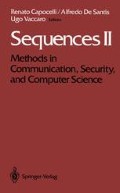Abstract
A secret sharing (threshold) scheme is an algorithm in which a distributor creates shares of a secret such that a minimum number of shares are needed to regenerate the secret. We propose a new homomorphic perfect secret sharing scheme over any finite Abelian group for which the group operation and inverses are computable in polynomial time. We introduce the concept of zero-knowledge sharing scheme to prove that the distributor does not reveal anything. A stronger condition than not revealing anything about the secret.
This research is being supported by NSF Grant NCR-9106327.
Access this chapter
Tax calculation will be finalised at checkout
Purchases are for personal use only
Preview
Unable to display preview. Download preview PDF.
References
J. C. Benaloh. Secret sharing homomorphisms: Keeping shares of a secret secret. In A. Odlyzko, editor, Advances in Cryptology, Proc. of Crypto ’86 (Lecture Notes in Computer Science 263), pp. 251–260. Springer-Verlag, 1987. Santa Barbara, California, U.S.A., August 11–15.
E. R. Berlekamp. Factoring polynomials over large finite fields. Mathematics of Computation, 24(111), pp. 713–735, 1970.
G. R. Blakley. Safeguarding cryptographic keys. In Proc. Nat. Computer Conf. AFIPS Conf. Proc, pp. 313–317, 1979. vol.48.
D. Coppersmith, A. Odlyzko, and R. Schroeppel. Discrete logarithms in GF(p). Algorithmica, pp. 1–15, 1986.
Y. Desmedt and Y. Frankel. Shared generation of authenticators and signatures. To be presented at Crypto ’91, August 12–15, 1991, Santa Barbara, California, U.S.A., to appear in: Advances in Cryptology. Proc. of Crypto ‘90 (Lecture Notes in Computer Science), Springer-Verlag, 1991.
R. G. Gallager. Information Theory and Reliable Communications. John Wiley and Sons, New York, 1968.
O. Goldreich, S. Micali, and A. Wigderson. How to play any mental game. In Proceedings of the Nineteenth annual ACM Symp. Theory of Computing, STOC, pp. 218–229, May 25–27, 1987.
S. Goldwasser and S. Micali. Probabilistic encryption. Journal of Computer and System Sciences, 28(2), pp. 270–299, April 1984.
M. Ito, A. Saito, and T. Nishizeki. Secret sharing schemes realizing general access structures. In Proc. IEEE Global Telecommunications Conf, Globe-com ’87, pp. 99–102. IEEE Communications Soc. Press, 1987.
N. Jacobson. Basic Algebra I. W. H. Freeman and Company, New York, 1985.
A. Menezes, S. Vanstone, and T. Okamoto. Reducing elliptic curve logarithms to logarithms in a finite field. In Proceedings of the Twenty third annual ACM Symp. Theory of Computing, STOC, 1991.
M. Naor and M. Yung. Public-key cryptosyterns provably secure against chosen ciphertext attack. In Proceedings of the twenty second annual ACM Symp. Theory of Computing, STOC, pp. 427–437, May 14–16, 1990.
A. M. Odlyzko. Discrete logs in a finite field and their cryptographic significance. In N. Cot T. Beth and I. Ingemarsson, editors, Advances in Cryptology, Proc. of Eurocrypt 84 (Lecture Notes in Computer Science 209), pp. 224–314. Springer-Verlag, 1984. Paris, France April 1984.
M. Rabin. Digitalized signatures and public-key functions as intractable as factorization. Technical report, Massachusetts Institute of Technology Technical Report MIT/LCS/TR-212, Cambridge, Massachusetts, January 1977.
M. Rabin. Probabilistic algorithms in finite fields. SIAM Journal on Computing, 9(2), pp. 273–280, 1980.
M. Rabin. Efficient dispersal of information for security, load balancing, and fault tolerance. Journal of the ACM, 36(2), pp. 335–348, April 1989.
R. L. Rivest, A. Shamir, and L. Adleman. On digital signatures and pulic-key cryptosystems. Technical report, Massachusetts Institute of Technology Technical Report LCS/TN-82, Cambridge, Massachusetts, April 1977.
A. Shamir. How to share a secret. Commun. ACM, 22, pp. 612–613, November 1979.
G. J. Simmons. A survey of information authentication. Proc. IEEE, 76(5), pp. 603–620, May 1988.
G. J. Simmons. Robust shared secret schemes. Congressus Numerantium, 68, pp. 215–248, 1989.
D. R. Stinson and S. A. Vanstone. A combinatorial approach to threshold schemes. SIAM Journal on Discrete Mathematics, 1(2), pp. 230–236, 1988. Extended abstract is in Advances in Cryptology, Proc. of Crypto ’87 (Lecture Notes in Computer Science 293).
Author information
Authors and Affiliations
Editor information
Editors and Affiliations
Rights and permissions
Copyright information
© 1993 Springer-Verlag New York, Inc.
About this paper
Cite this paper
Desmedt, Y., Frankel, Y. (1993). Perfect Zero-Knowledge Sharing Schemes over any Finite Abelian Group. In: Capocelli, R., De Santis, A., Vaccaro, U. (eds) Sequences II. Springer, New York, NY. https://doi.org/10.1007/978-1-4613-9323-8_28
Download citation
DOI: https://doi.org/10.1007/978-1-4613-9323-8_28
Publisher Name: Springer, New York, NY
Print ISBN: 978-1-4613-9325-2
Online ISBN: 978-1-4613-9323-8
eBook Packages: Springer Book Archive

